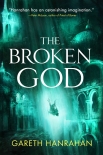The Broken God by Gareth Hanrahan (most life changing books .txt) 📗

- Author: Gareth Hanrahan
Book online «The Broken God by Gareth Hanrahan (most life changing books .txt) 📗». Author Gareth Hanrahan
“We can’t make it all the way by land,” mutters Myri. “Maybe we make for the coast again once we’re south of Ram’s Head. Find another ship for the last leg to Khebesh.”
She sounds like Cari. Just get south of Ram’s Head. Just get to Ilbarin City.
Khebesh is always just out of reach, a retreating mirage.
Other thoughts that cross Cari’s mind are equally disturbing, but they’re all her own. She thinks about Adro, and hopes he’s recovering from his wounds. Thinks about Ren and Ama, and how glad she is that they never came here. The child, especially, would be vulnerable. Children are impressionable, easy clay for the gods to work. Jermas meant to use you when you were nine, she remembers, and thinking of her grandfather puts her in mind of the Crawling Ones. Would Twelve Suns Bleeding have been able to find a better path to Khebesh?
Most of all, she thinks of Spar, and how far from home she’s strayed.
Cari suggests they head south for the market town of Erephis. It’s years since she was last there, and all she remembers of it is watching soldiers from Ul-Taen marching through the square on their way to war with Ishmere. The crowds cheering, and robed priests scattering holy sand in their path. Back then, the Godswar was far away. Now, it’s all around them, in their lungs, on their skin, seeping into their souls. Writ on the ruined world around them. And this still isn’t the front lines – the real fighting’s moved back north-east, she guesses, towards the heart of Ul-Taen. Ever since the Sacred Realm of Ishmere lost their war goddess and had to fall back, the resurgent deities of these conquered lands have reasserted themselves, broken gods shambling to war once more.
Cari shivers; she killed the war goddess, she launched the last god-bomb. How much of the devastation around her is her fault? It’s not like she has any love for Ishmere and its mad gods, but there’s still that sickening doubt in the back of her mind that she’s only made things worse. How do you trust your actions when you can’t predict the consequences? Fuck it, look at Artolo – if she’d killed the fucker stone dead back in Guerdon, then everything would be different.
“Carillon. Watch yourself,” warns Myri. Carillon glances down, realises she’s nearly walked straight into a patch of poisonous flowers. “Stick to the path. And let me lean on you.” Myri’s hand, trembling and scabby, threads through the crook of Cari’s elbow, but the sorceress is hardly any burden at all. She’s burned hollow.
They cross the broken land. The spirits of this place seem especially offended by Cari’s presence. The same feeling of friction and pressure that she felt before encountering Usharet, but it’s a constant here, like the air’s made of sandpaper that only affects her soul. Several times, godhusks manifest to strike at her. Most of these manifestations are more pathetic than dangerous, the god appearing as nothing more than a cloud of dust, a single serpent that speaks with a human voice, or a shambling mound of rubble that crawls slowly across the landscape towards them. Other manifestations, they flee or fight, Myri’s spells flashing in the twilight. Mostly, though, it’s just mud and dust and shattered stone. A no-gods-land where nothing lives.
The fighting seems worse to the west. That way lies the Sacred Realm of Ishmere. It’s over the horizon, too distant to affect them directly. The sky over there looks like it’s on fire, and Cari discovers she can’t sleep when facing that way without being troubled by nightmares of a hammer falling on her. She wakes screaming about the judgement of High Umur.
They do not go west. They go south, stumbling for days through the ever-shifting lands.
Erephis is gone. “I think a really, really big snail ran over it,” says Myri, and Carillon wished she didn’t agree. By the edge of the glistening canyon, Myri bargains with some ghosts, trading a handful of coins for the location of a cache of food and news of the wider war.
“What the fuck do ghosts want with cash?” mutters Cari as she digs a handful of tin cans out of a mudbank. There are more bodies buried here, too, the flesh seared by slime, and the bones turn to mush in her hands as she pulls them out of the way. A military expedition, she guesses. She salvages a miraculously intact jacket from one of them.
“The Empire of Haith broke the local death-god, years ago,” explains Myri. “It was the custom of these people to put coins on the eyes of the dead, to pay for their passage into the afterlife. The Haithi forced the goddess to only accept Imperial currency, but now Haith is in retreat and it’s hard to get Haithi coins this far south. So, the dead souls go unclaimed and the dead walk the earth.” She counts out her remaining coins, hides them away. “Just in case we need to pay for passage elsewhere. Anyway, they said there are living folk a day’s travel south. We’ll head that way.”
Cari brushes mud, ichor and soldier-bits off a can and tries to read the label. “Don’t we want to stay the fuck away from people? Anyone we meet here is probably going to try to kill us, right?”
Myri injects another vial of her medication before answering. “The presence of the living to the south implies that conditions there currently permit life to exist in that region. That’s not true everywhere in the Godswar.”
On the fifth day in hell, they come to the ghost of the city of Gissa. Even Cari knows that Gissa was destroyed, ten years ago or more, Gissa of the red roofs and the counting-houses, Gissa of the temples and the red walls, Gissa of the deep wells.
Gissa should be a lot further south.
They hide in a ditch and





Comments (0)